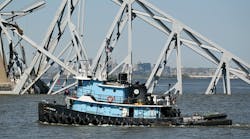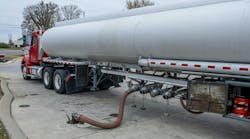Though many believe the potential for natural gas to power commercial trucks is waning, don’t tell that to the city of San Diego. The West Coast city is converting its fleet of refuse trucks to run on liquefied natural gas (LNG) for one simple reason: they are saving money by using alternative fuels.
“Once we got the bugs worked out, we found our LNG-powered refuse trucks cost us less to maintain than our diesel-powered units,” said Richard Hays, recently retired director of the city’s environmental services department, which handles refuse collection for the city.
The city initially began converting its fleet in 1995-1996 with the purchase of 33 LNG-powered trucks because “it was the right thing to do” in terms of improving air quality, said Hays during a speech at Waste Expo in Dallas last week. Now, however, the cost savings are becoming a much more high-profile issues, especially in relation to skyrocketing diesel prices, he said.
“We now have 80 of our 200 refuse vehicles running on LNG,” Hays said. “The LNG trucks do cost more— $20,000 to $30,000 more per truck than a similar diesel model— but we received federal and state grants to cover the difference.” So, in essence, the cost to the fleet of an LNG truck is equal to a diesel powered one, he explained.
Then there’s the fuel cost savings. “Diesel trucks may have more range, but we’re spending 52 cents for an equivalent gallon of LNG, compared to well over $2 a gallon for diesel,” said Hays.
The LNG trucks are so popular that the city’s drivers are “fighting” over who gets to use them. “They are quieter, smell better, and have less vibration than our diesel trucks,” said Hays. “We knew the technology would work, but having drivers argue over them this way validates the conversion effort on a whole other level.”
Hays pointed out that the issues diesel fuel is facing today – low inventories and oil production cuts forcing price hikes – could one day face fleets running on natural gas. That’s why he thinks conversion efforts like the one in San Diego are a “stepping stone” to the ideal fuel of the future for refuse haulers: landfill gas.
“One of my other hats at the department was that of energy czar for the city, and the problem I started seeing was the a growing shortage of LNG worldwide, to the point where we might need to import it, much the way we do with oil,” he said. “That’s why I think the important thing about using natural gas as a fuel is that it leads us to refining landfill gas – made up mostly of methane – and using it to fuel our vehicles. I think that’s the future for alternative fuels in the waste industry.”


